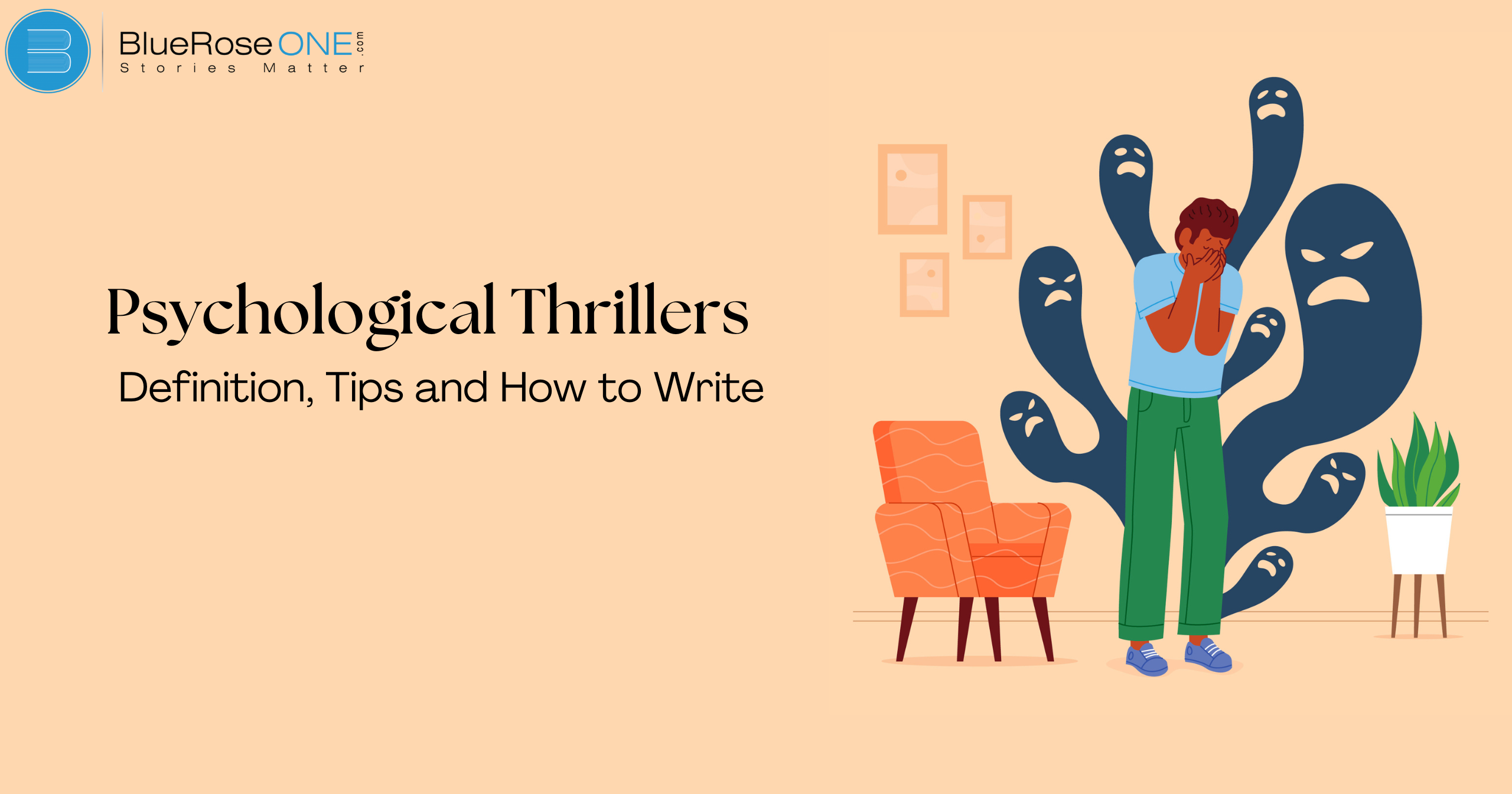Psychological thrillers are compelling, mind-bending stories that explore the complexity of human conduct. They keep readers on the edge of their seats, questioning their assumptions and drawing them into a web of suspense. Let’s dive down what makes this genre so appealing, and how you can master composing it.
What is a Psychological Thriller?
A psychological thriller is a type of fiction that mixes mystery, suspense, and drama. Unlike traditional thrillers, psychological thrillers focus on people’ internal issues rather than external action, examining themes such as fear, morality, and the mind.
You may also like: What is an Epigram? Definition, Uses and Examples
Key Elements of a Psychological Thriller
Psychological Depth
Psychological depth is an essential component of a psychological thriller, focusing on the inner workings of characters’ minds.
This genre delves into deep emotions, hidden agendas, and mental conflicts, generating a compelling sense of tension. Readers are attracted into the characters’ minds, often questioning their trustworthiness or motives.
A psychological thriller captivates and engages the audience by digging into fears, obsessions, and vulnerabilities. Writers can improve this by including vivid internal dialogue and demonstrating how characters’ thoughts influence their actions.
Suspense and Tension
Suspense and tension are crucial elements in a psychological thriller, keeping readers on edge as the story progresses.
These aspects heighten suspense and generate a sense of discomfort, frequently by withholding key information or introducing unexpected turns. The psychological thriller genre focuses on delving into people’ minds, making their fears and motivations vital to the storyline.
Authors use pacing, cliffhangers, and psychological difficulties to create captivating narratives that keep readers interested until the very end.
Twists and Turns
A psychological thriller relies on unexpected twists and turns to keep readers guessing. These story developments test the audience’s assumptions, frequently leading them down unexpected routes.
Twists in a psychological thriller are more than just surprises; they are intricately linked to the characters’ motivations and psychological states.
They heighten the suspense, add dimension to the story, and keep readers interested. Creating convincing yet startling developments is critical for maintaining the suspense that defines the psychological thriller genre.
You may also like: Where the Red Fern Grows: Book Summary & Themes
Characteristics of a Psychological Thriller
Fear and Anxiety
Fear and anxiety are important to a psychological thriller, adding tension and suspense to keep readers interested. These emotions are frequently triggered by the protagonist’s internal conflicts, erroneous perceptions, or impending danger.
The story creates tension with untrustworthy individuals, unexplained reasons, and unexpected twists.
This genre focuses on psychological manipulation, where dread is not only external but also ingrained in the psyche, making a psychological thriller extremely disturbing and emotionally compelling for its viewers.
Manipulation and Control
Manipulation and control are key to a psychological thriller, which builds tension by analyzing the power dynamics between people. Protagonists frequently face manipulative adversaries that use fears, secrets, or emotions to control the story.
This topic keeps readers on edge as characters deal with deception, mind games, and the fuzzy border between reality and illusion. In a psychological thriller, this interplay not only propels the plot but also digs deep into the psyche, revealing the vulnerability of trust and perception.
Unique Features That Define the Genre
A psychological thriller goes deeply into the psyche of its protagonists, examining their anxieties, motivations, and moral quandaries. Unlike other thriller genres, it emphasizes psychological struggle and emotional instability over physical action.
Plot twists, untrustworthy narrators, and tremendous character-driven suspense are essential ingredients that keep readers wondering.
These stories frequently blur the limits between reality and perception, generating a sense of dread and unease that defines the psychological thriller experience.
You may also like: What is Thiller: Definition, Examples and More
Tips for Writing a Psychological Thriller
Start with a Strong Premise
Begin with a great premise that grabs readers from the start, as this is the foundation of a captivating psychological thriller. Concentrate on a unique concept that dives into the complexity of the human mind, such as hidden agendas, moral quandaries, or skewed views. An intriguing idea not only establishes the tone, but also generates curiosity and suspense.
Ensure that the concept is based on psychological depth, keeping readers interested and anxious to discover the story’s twists and surprises.
Build Complex Characters
Complex characters are vital in psychological thrillers for building tension and intrigue. Concentrate on developing multidimensional characters and antagonists with rich backstories, emotional conflicts, and hidden motivations. These complexities make their behaviors unexpected, which keeps readers interested.
Demonstrate their psychological problems through subtle behaviors, inner thoughts, and morally problematic choices. Well-crafted characters heighten the suspense and create a riveting tale by drawing readers into their brains and compelling them to discover their true motives.
You may also read: Book Review: Lord of the Flies by William Golding
Maintain Suspense Throughout
To keep readers engaged throughout a psychological thriller, use unexpected twists and slow discoveries. Avoid giving away essential story aspects too soon; instead, create tension by establishing a sense of unease and ambiguity.
Introduce untrustworthy individuals, hidden intentions, or opposing viewpoints to make readers wonder what’s true.
By meticulously timing the narrative and exposing information piece by piece, you maintain a high level of tension, keeping readers engaged until the finish of your psychological thriller.
Use Unreliable Narrators
In a psychological thriller, an untrustworthy narrator can heighten suspense and perplexity, keeping readers on edge. By giving a biased or skewed point of view, the narrator might mislead the listener, making it difficult to determine what is true. This doubt lends dimension to the plot by making readers question every aspect. Using this method properly in a psychological thriller builds suspense, making the eventual disclosure even more stunning and fulfilling.
Incorporate Twists Strategically
Incorporating twists wisely is critical while writing a psychological thriller. These unexpected story twists leave readers on the edge of their seats, asking what’s true and what’s not.
However, it is critical to add twists at the correct time—too early, and they lose effect; too late, and they may appear hurried.
Ensure that the twists are well-planned and relate back to the ideas of the psychological thriller, providing depth and complexity to the plot.
Master the Art of Pacing
Writing a psychological thriller requires mastering the art of timing. The trick is to maintain the tension high while allowing for calm thinking to heighten the sense of discomfort.
Gradually expose crucial information, leaving hints and cues to keep the reader guessing. Avoid speeding through scenes; instead, highlight critical moments to build suspense. Proper pace in a psychological thriller keeps your audience engaged and on edge until the very end, anticipating the next twist or revelation.
You may also read: What is Rising Action in a Story? Definition and Examples
How to Create Engaging Psychological Thrillers
Create an Intricate Plot
To create an elaborate storyline for a psychological thriller, incorporate twists and turns that keep readers guessing. Begin by creating complex people with hidden motivations and placing them in hard, high-stakes scenarios. Slowly expose hints and red herrings that deceive both the protagonist and the audience, resulting in suspense.
Incorporate psychological tension by exploring topics such as trust, dishonesty, and manipulation. A well-crafted narrative is vital for keeping readers on the edge of their seats and making your psychological thriller both engaging and unpredictable.
Develop Psychological Depth in Characters
To give characters psychological depth in a psychological thriller, concentrate on their inner conflicts, motivations, and fears. Create multidimensional personalities by delving into their prior experiences, insecurities, and worldviews.
Allow their behaviors to reflect complicated emotions and unpredictable behavior, which will keep the reader involved. This psychological depth makes the characters’ decisions more interesting and heightens the suspense of the plot, which is essential in a psychological thriller. The more realistic and layered the characters are, the more compelling the thriller.
Create Tension in Every Scene
Creating tension in each scene is critical for creating a riveting psychological thriller. Keep readers on edge by creating uncertainty, contradictory emotions, or a potential threat.
Build suspense by using subtle clues, untrustworthy narrators, or surprising developments that challenge the characters’ preconceptions.
Pacing is critical—allow moments of quiet to heighten stress when danger returns. By keeping a sense of unease throughout, you will keep readers interested until the last reveal, making your psychological thriller memorable.
Leverage Atmosphere and Setting
Examples of Popular Pyschological Thrillers
Bestselling Books
- Gone Girl by Gillian Flynn
- The Girl on the Train by Paula Hawkins
Iconic Movies and TV Shows
- Se7en
- Black Swan
- Mindhunter
To produce an interesting psychological thriller, atmosphere and environment must be used well. A well-crafted setting may heighten tension and draw readers into the plot.
Whether it’s a gloomy, secluded house or a busy city full of hidden secrets, the location should mirror the characters’ inner conflict. Use sensory information to create terror, unease, and tension. By expertly combining the setting with the psychological turmoil, you may heighten the emotional impact and keep readers on the edge of their seats throughout your psychological thriller.
You may also like: Scribd Vs. Audible: Which One is Better for You?
Conclusion
Psychological thrillers appeal to audiences because they explore universal concerns and moral quandaries. They challenge perceptions and push the boundaries of storytelling, making them a popular genre in fiction.
















